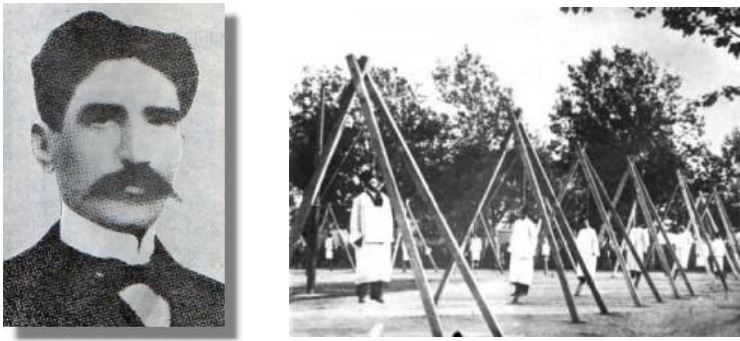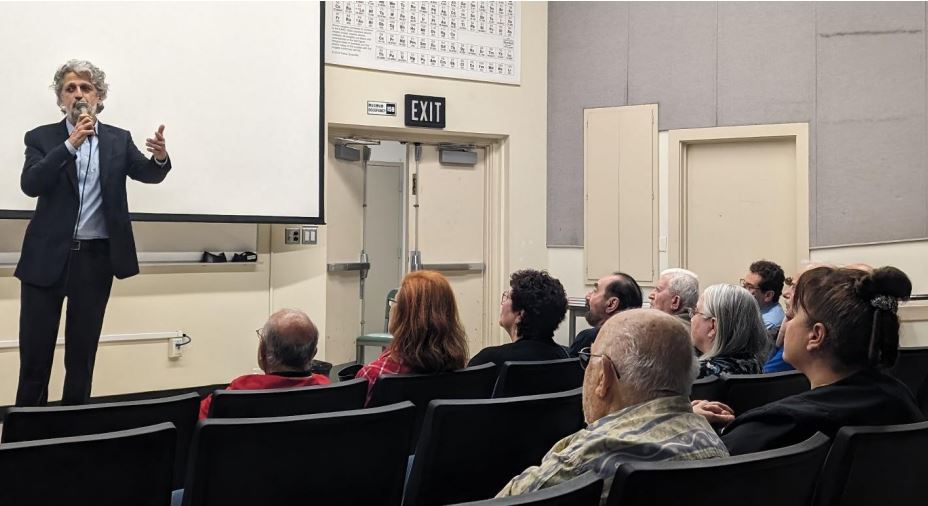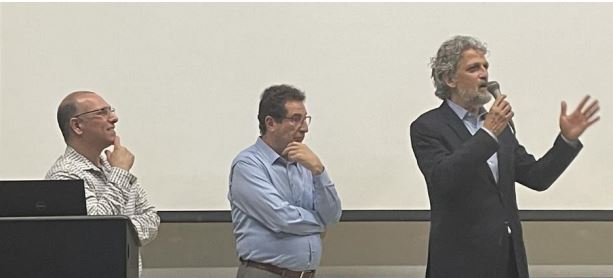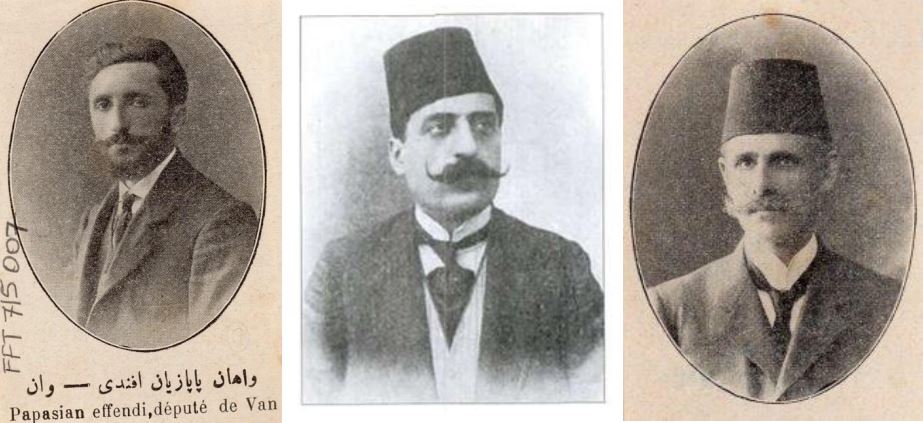FRESNO — On Friday, April 19, 2024, Fresno hosted the film RED, an official selection of 2018 The Pomegranate Film Festival in Toronto, and the crowd gathered had the opportunity to hear from the producer and director Mr. Kadir Akin as well as Mr. Garo Paylan, both founding members of the People’s Democratic Party (HDP) and leading democracy activists in Turkey. This event was made possible by the support of the Armenian Cultural Conservancy of Fresno and Massis Publishing.
The documentary film RED, based on the book written by Mr. Akin, Armenian Revolutionary Paramaz: Armenian Socialists and Genocide from Abdul Hamid to [the Committee of Union and Progress], examines the statements, ideas, and actions of Mattteos “Paramaz” Sarkissian, a leader of the Social Democrat Hunchakian Party (est. 1897), along with the Armenian Question in the Ottoman Empire and the subsequent Armenian Genocide. Akin is also author of The Crisis of Socialism: Unity and Re-establishment and In the Trail of Hidden History: Modernization in the Ottoman Empire, Constitution, Roots of Socialism, and Armenian Deputies.
Following the 1908 revolution, the Parliament was reopened with elections of 288 members, including 147 Turks (including some Kurds), 60 Arabs, 27 Albanians, 26 Greeks, 14 Armenians, 10 Slavs, and 4 Jews. Two representatives from the Armenian Revolutionary Federation (ARF), one from the Thessaloniki Socialist Workers’ Federation (SSIF), and one from the Social Democrat Hunchak Party (SDHP) started a “socilalist deputies” caucus. These deputies spoke of the need to co-exist and fought for workers’ rights, unions, women’s rights, decentralized government. These deputies dreamed of creating a more harmonious society.
Akın expressed excitement when he first read Paramaz’s internationalist political perspective expressed during his defense at the Van Court while facing trial in 1897:
“Our demand is to live on equal terms with Armenians, Turks, Kurds, Greeks, Alevis, Laz, Yazidis, Syriacs, Arabs and Copts. As a revolutionary, I believe we will achieve this goal. (…) We are not nationalists; we are not guided by the motivation of ‘nation-building.’ We are friends of the people, not chauvinistic nationalists. We know that a nationalist rule will maintain the same order. Our demand is that all inhabitants of Armenia, Armenians, Kurds, Turks, Arabs, Laz, Circassians, Assyrians, Yazidis and Mitrib elect their own rulers by their own will and vote. We demand this future for all inhabitants of Armenia, for all Ottoman peoples.”
Through the written word and the film Red, Akin, who himself was imprisoned from 1982 to 1988 following the September 12th coup in Turkey in 1980, unearths the origins of the socialist movement in Turkey led by Armenian intellectuals and deputies as members of the Chamber of Deputies of the Ottoman Empire during the Second Constitutional Monarchy (1908-1915). As a researcher and journalist, Akin challenges both the nationalistic/’right-wing’ and alternative/’left-wing’ accounts of the past by shedding light on the pivotal contributions of Armenian, Greek, Jewish, and Bulgarian revolutionaries in the emergence of socialist politics in the late Ottoman era.
These Armenian intellectuals advocated for revolutionary ideas, including addressing the poverty brought by the economic destruction during the reign of Sultan Abdul Hamid, the 1908 Workers’ Strikes, women’s rights, freedom of the press, and the demands of the Christian peoples of the Empire. From the floor of the Ottoman Turkish Parliament, Deputies Vahan Papazyan of Van (above left) spoke out on education policies (May 8, 1911), Vartkes Serengulyan of Erzerum (above center) defended laborers’ rights against the capitalist class, and Hampartzoum Boyadjian of Adana (above right) spoke about workers’ unions and fraternity.
Garo Paylan, who served for two consecutive terms—2015–18 & 2018–23—in the Grand National Assembly of Turkey representing Istanbul and Diyarbekir, expressed his personal thanks to Kadir Akin for uncovering the history of these progressive voices which “can break down the prejduces and bring unity across different ethnic groups in Turkey today as we struggle for a multicultural, democratic, and more equal society.”


Dr. Jendian asked if any members of the audience knew about these stories, and not a single hand raised (including his own): “Thank you, Mr. Akin, for raising our collective awareness of our own history. This history is both important and personal to me, as my own grandfather, identified with the Social Democratic Hunchakian party. Both you and Mr. Paylan have been living examples of courage, being willing to speak truth to power in a country where doing so could lead to imprisonment.”
Article 301 of the Turkish Penal Code, effective as of June 1, 2005, makes it a criminal offense to insult Turkey, the Turkish nation, Turkish government institutions, or Turkish national heroes, punishable by imprisonment from 6 months to 2 years. In October 2011, sociologist Taner Akçam won a judgment in the European Court of Human Rights, which ruled that the Turkish laws against “denigrating Turkishness” were a violation of freedom of expression. Yet, in 2018, Garo Paylan faced 2 indictments, including “defaming Turkey and the Turkish state” and “insulting Turkishness” for his comments referring to the 1915 Armenian genocide from the podium of the Turkish parliament.


More recently, in September 2023, Turkey’s oldest film festival was canceled amid controversy surrounding a politically sensitive documentary about the aftermath of a 2016 coup attempt against the Turkish government and President Recep Tayyip Erdoğan. The mayor of the city of Antalya announced the cancellation of the city’s Golden Orange Film Festival after the Turkish Culture and Tourism Ministry withdrew its support for the event because of the film “Kanun Hükmü” or “Decree,” a documentary which focuses on the hardships of a teacher and a doctor who were dismissed from their jobs following an attempted coup in Turkey on July 15, 2016.
Paylan concluded the evening, reminding the audience that, whether we are discussing the Ottoman Empire of 1915 or the modern-day government of Azerbaijan, the Russian government under Putin or the United States, “governments do not have morals; they have interests.” Even the future of the Republic of Armenia rests on that understanding and suggests possible courses of action. It’s also up to the people to organize and speak up for justice—across ethnic lines and national boundaries—as public pressure creates the political will for leaders to do right by the people.










